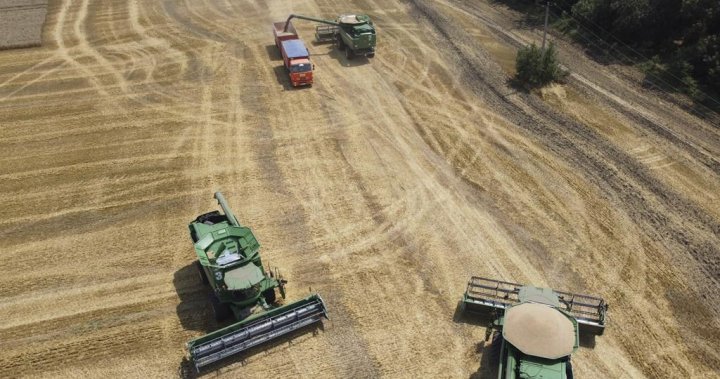
Ukraine war adding massive costs for farmers – and consumers are about to feel it too
Global News
The Russian invasion of Ukraine has helped spike the cost of living and Canadian farmers are facing massive costs to continue running their operations.
As Russia‘s invasion of Ukraine drives consumer prices higher globally, Canadian farmers are feeling the sticker shock, too, as they incur massive costs to continue running their operations and ensure grocery store shelves remain stocked.
“It could easily be into the thousands of dollars a day to increase costs,” said Todd Lewis, second vice-president of the Canadian Federation of Agriculture.
Lewis, a grain and oilseed producer in Gray, Sask., said rising costs as a result of Russia’s invasion of Ukraine, which has limited the exports of wheat, oats and other necessary food supplies, will lead to higher costs for farmers. Both Russia and Ukraine are key grain suppliers to large parts of the world.
But the rising prices don’t stop there, as fertilizer, which is necessary for almost all farmers, became more expensive to purchase since the start of the war on Feb. 24. Fertilizer prices had already skyrocketed in the past year, according to industry experts. Russia is the second-largest producer of ammonia, urea and potash and the fifth-largest producer of processed phosphates.
Additionally, fuel prices are skyrocketing and with most farmers relying on heavy equipment machinery to run their farms, that will have a heavy cost, according to Lewis. He said that farmers have a ‘three Fs’ rule, which stands for food, fertilizer and fuel. He said while food is the most important of the three, they cannot get there without the fertilizer and fuel.
“When it comes to fertilizer we may even be looking at tens of thousands a day in increased cost compared to last year. So we’re going to see a significant cost increase,” said Lewis.
While some of the increasing commodity prices are helping to make the price pinch initially a little easier to digest, Lewis noted resources getting more expensive “adds risk to farming operations.” He said farmers will be required to provide more capital upfront at a time when growing crops comes with a lot of uncertainty.
During the 2021 farming season, there were significant droughts, especially in the prairies, followed by multiple extreme weather events, like wildfires in British Columbia and other parts of Canada. The unexpected weather coupled with a war affecting prices will put pressure on farmers, according to Katie Ward, president of the National Farmers’ Union.





















 Run 3 Space | Play Space Running Game
Run 3 Space | Play Space Running Game Traffic Jam 3D | Online Racing Game
Traffic Jam 3D | Online Racing Game Duck Hunt | Play Old Classic Game
Duck Hunt | Play Old Classic Game